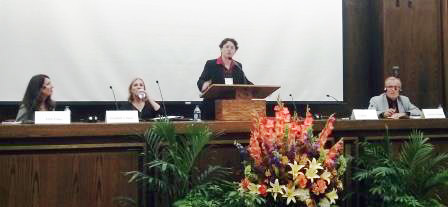





Reported by Gaylee Coverston
In this second plenary session, Elizabeth A. Clark, Associate Director of the International Center for Law and Religion Studies, moderated our distinguished delegates Elizabeth Shakman Hurd, Jean-Paul Willaime, and Effie Fokas. The session began with Professor Hurd, Associate Professor and Director of Graduate Studies at Northwestern University. With a return of religious emphasis in the United States, discussions regarding religious freedom and secularism are on the rise. She delved into the question of varieties of secularism being more a case of varieties of establishment. Establishment was clarified as a cultural understanding of a recognizable entity. In classifying forms of secularism as forms of establishment, she proposed that we can move beyond religion and secularism as individual topics and address the reality of what the two topics represent in actuality. Professor Hurd presented a brief history of the United States' international efforts regarding religious freedom and how those efforts came from the concept of America acting as a global leader regarding the subject of freedom. She moved on to discuss issues in the U.S. foreign actions to promote religious freedom and tolerance internationally. In her presentation she unveiled the tendency for U.S. politics and political maneuvering to play a more intricate part in international religious freedom aid than is currently recognized by the average citizen. She also included how American establishment, or cultural understanding, often directs religious freedom aid. Such aid is given to entities or religions better understood and recognized by said establishment and will receive more attention than those that are not, sounding a call to be aware of this issue.
Professor Jean-Paul Willaime, Research Director of the Department of Religious Studies at Sorbonne in Paris, discussed the issues of religious freedom and education in France. He began with a historical view on the educational system in France. Historically, France had been a catholic state and education included religious catechism. As time passed, conflict between the state and private schools arose and integration of private schools receiving financing ensued. Moral and civic education replaced religious education in schools. Currently, secular knowledge and religious knowledge in compulsory education is treated as cultural facts. Great historical text are taught as that: great historical texts. These texts include literature from Homer's Odyssey to the Bible. He concluded that religion, by nature, does not necessarily concern us but it is necessary to understand religions and freedom of conscience to promote peace and tolerance. Education on religion presented in a factual and respectful format will help us achieve that purpose.
Effie Fokas, Research Fellow at the Hellenic Foundation for European and Foreign Policy and the London School of Economics, presented her research on cultural and religious identity in the countries of Russia, Romania, Bulgaria and Greece, " Banal , Benign or Pernicious: the relationship between religion and national identity from the perspective of religious minorities." She discussed the intricacies of cultural and religious identity and how those subjects play an integral part in tradition and political acceptance. She categorized the impact into three types: Banal, Benign or Pernicious. Even as she presented these categories, she gave the caveat that the lines between these categories are fuzzy. She cited examples to support each category from her research with the above countries. Banal items were visible yet not necessarily problematic if accepted with respect for historical precedent. Benign issues treated practices that were necessary and positive unifiers. Finally, the pernicious encompassed things that could influence or change policy, promote misunderstanding and intolerance or limit personal and public expression of beliefs. She cited constitutional case history in the US to further define the intricacies of culture, religion and national identity, particularly citing Pledge of Allegiance cases. She concluded that the best way to resolve issues arising would be to teach culture and national identity in a different way. However, she cautioned that treating history, culture and national identity in a different way could cause friction in traditional groups and some religions.
